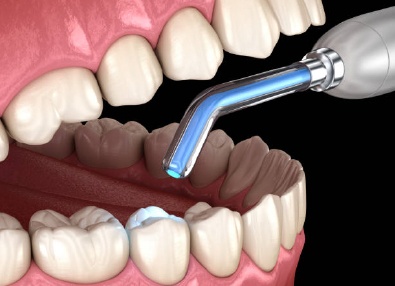Preventive
Everyone brushes their teeth three times a day right after you eat?!
Bacteria from that food causes a biofilm called plaque.

If not removed from the teeth, plaque hardens into dental calculus (also called tartar). Calculus builds up between teeth and between your teeth and gums, and can cause gums to become inflamed or infected.
This in turn can lead to gum disease (see below), which has been linked to a host of other medical issues, including diabetes, dementia, and heart disease However, although regular brushing and flossing can get rid of surface plaque, once it solidifies into calculus, the material is too tough to be scraped off with dental floss or a toothbrush—that’s where regular cleanings with your Fresh Dental Smiles dental hygienist comes in handy.
During a professional cleaning, your hygienist first scales your teeth, scraping the calculus off them with a specialized tool. Once your teeth are calculus-free, your hygienist polishes them with a handheld tool and an abrasive paste that removes minor stains and smooths the surface of your teeth so that plaque won’t adhere to them as easily.
While most people need regular cleanings, some have so much calculus built up that they need extra care. This additional buildup may be caused by age, hereditary factors, or poor oral hygiene (which includes skipping regular cleanings – you know who you are 🙂 ).
If your Fresh Dental Smiles dentist recommends deep cleaning, it’s very important to follow through, as you likely have the beginnings of gum disease. Deep cleaning will remove calculus from above and below your gum line, and get rid of rough places where bacteria collects.
Periodontal (Gum Disease) Treatment
Fresh Dental Smiles is committed to focusing on diagnosis and prevention of gum disease at its earliest point. You will be screened for signs and symptoms of gum disease during visits to our offices. Once diagnosed, treatment for gum disease can include non-surgical treatment in-office for earlier stages, and/or referral to a specialist when necessary.
Antibiotic therapy, such as Arestin, can also be used to treat gum disease and may be recommended as part of your overall care plan. Follow-up care, usually every 3 months, is necessary to reduce risk for progression of disease. If left untreated, periodontal disease, better known as gum disease, can increase risk for other conditions including pre-term delivery with pregnancy, respiratory disease, diabetes and heart disease.
Signs of gum disease can include:
- Bleeding gums
- Puffy, red, and sore gum tissues
- Bad breath
- Receding gums
- Loose teeth possibly related to loss of bone around the teeth
